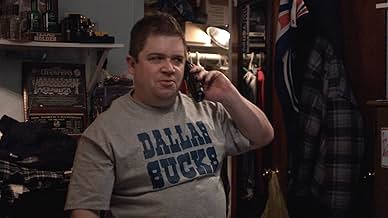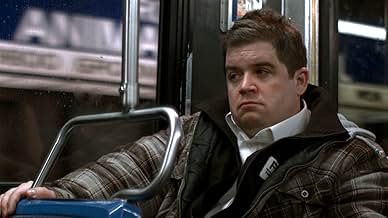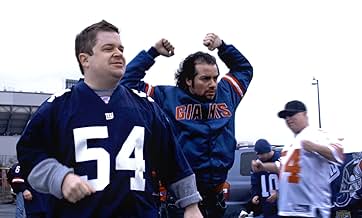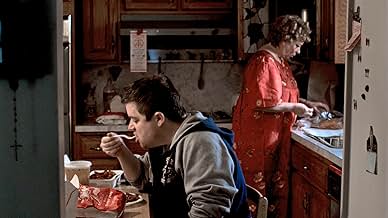IMDb-BEWERTUNG
6,6/10
10.093
IHRE BEWERTUNG
Ein eingefleischter Fan der New York Giants kämpft mit den Folgen, wenn er von seinem Lieblingsspieler verprügelt wird.Ein eingefleischter Fan der New York Giants kämpft mit den Folgen, wenn er von seinem Lieblingsspieler verprügelt wird.Ein eingefleischter Fan der New York Giants kämpft mit den Folgen, wenn er von seinem Lieblingsspieler verprügelt wird.
- Auszeichnungen
- 1 Gewinn & 5 Nominierungen insgesamt
Sidné Anderson
- Hospital Doctor
- (as Sidne Anderson)
Empfohlene Bewertungen
Simplicity is a rare commodity in today's fast moving, conglomerate world, but for Paul Aufiero (Patton Oswalt) there's only one thing that matters in his life. Everything else is irrelevant in comparison and it isn't his wife, or his child, or his family in general; it is the American Football team the New York Giants. As the self-proclaimed 'biggest Giants fan ever' Paul lives, breathes, shouts, screams, and sleeps everything about the team. He even situates a poster featuring his favourite player Quantrell Bishop (Jonathan Hamm), the Giants quarterback, above his single-bed. But when an opportunity arises to meet Quantrell, the player mistakes Paul for a stalker and violently strikes out causing his instant hospitalisation. Once released he has to come to terms with the fact that his simple, linear life is now starting to crash around him, like a fumble in the final moments of the Super Bowl, as his family, the media and the team all want a piece of the Giants 'Big Fan'.
Written and directed by Robert Siegel on a minimal budget, 'Big Fan' is a surprising independent gem that attains the majority of its prowess from an outstanding offensive performance by Patton Oswalt as the man who lives for the Giants. His support is monumental as he travels week in and week out to merely sit in the car-park outside Meadowlands Stadium and watch the game on a portable TV with his right-hand fan Sal (Kevin Corrigan). While he spends his job as a parking attendant writing up witty remarks to use on the Sports Dogs nightly call-in Sports show – of which one participant called Philadelphia Phil becomes Paul's nemesis over-time. There banter over the airwaves becomes one of the biggest driving forces of Paul's life while he isn't thinking about the next game. But after the assault takes place, his loyalty, and in turn his life starts to become torn apart. His family want him to turn the event in an opportunity to sue the player; the local authorities want him to press charges against quarterback, while the team are on a losing streak as Quantrell has been suspended while the investigation is on-going. All the while, all Paul wants is to support the team and nothing more. He doesn't have the greed and the ambition that others do. To him the Giants are his life-support machine, and if you take those away he would flat-line in an instant.
While Oswalt's performance is mesmerising, Robert Siegel's writing and direction must also be commended. His script is honest and straight-to-the-point, he captures it captures all the awkward events of Paul's life perfectly, including the argument between the brothers on the toilet. While he uses the space of the world around him perfectly to capture Paul's subtle isolated life brilliantly and at the same time Siegel also uses the, sometimes overtly exaggerated, close-up shot to portray the characters emotions within this one man's own perfect universe. 'Big Fan' is low budget, high impact film that thrives off a gleaming central performance by Patton Oswalt, and is definitely one of the best independent films of the last couple of years.
Written and directed by Robert Siegel on a minimal budget, 'Big Fan' is a surprising independent gem that attains the majority of its prowess from an outstanding offensive performance by Patton Oswalt as the man who lives for the Giants. His support is monumental as he travels week in and week out to merely sit in the car-park outside Meadowlands Stadium and watch the game on a portable TV with his right-hand fan Sal (Kevin Corrigan). While he spends his job as a parking attendant writing up witty remarks to use on the Sports Dogs nightly call-in Sports show – of which one participant called Philadelphia Phil becomes Paul's nemesis over-time. There banter over the airwaves becomes one of the biggest driving forces of Paul's life while he isn't thinking about the next game. But after the assault takes place, his loyalty, and in turn his life starts to become torn apart. His family want him to turn the event in an opportunity to sue the player; the local authorities want him to press charges against quarterback, while the team are on a losing streak as Quantrell has been suspended while the investigation is on-going. All the while, all Paul wants is to support the team and nothing more. He doesn't have the greed and the ambition that others do. To him the Giants are his life-support machine, and if you take those away he would flat-line in an instant.
While Oswalt's performance is mesmerising, Robert Siegel's writing and direction must also be commended. His script is honest and straight-to-the-point, he captures it captures all the awkward events of Paul's life perfectly, including the argument between the brothers on the toilet. While he uses the space of the world around him perfectly to capture Paul's subtle isolated life brilliantly and at the same time Siegel also uses the, sometimes overtly exaggerated, close-up shot to portray the characters emotions within this one man's own perfect universe. 'Big Fan' is low budget, high impact film that thrives off a gleaming central performance by Patton Oswalt, and is definitely one of the best independent films of the last couple of years.
"Big Fan" is an unpleasant movie about an extremely unpleasant man.
Patton Oswalt plays a dumpy 37-year-old loser who lives with his mother and spends his life living vicariously through the glories of the New York Giants. On a night out on the town, he and his buddy catch sight of their favorite player and follow him to a nightclub. When they approach him, a misunderstanding leads to Oswalt getting badly beaten by him. But he refuses to take legal action against him despite the admonishments of his family, because he'd rather see his favorite player able to lead his team to a win than seek remuneration for himself.
"Big Fan" starts out as a low-key comedy, but gradually picks up dark overtones and seems like it's going to take its audience to some uncomfortable places. Oswalt's character comes across as a schlubby but mostly decent guy at first, but as the movie progresses, we start to wonder if he might be mentally unhinged. However, a cop-out ending lurches the film back into uneasy dark comedy, and basically asks us to find Oswalt's character endearing even though he's been nothing but off putting.
The tone is all over the place, the comedy never really working. If the film had acknowledged that Oswalt's character is a loser, and made some kind of point about the fine line that begins to separate hobby from obsession, it might have been more interesting. But it instead asks us to take his side, and seems to take the stance that his obsession is just the healthy interest of your everyday man-child. The movie goes out of its way to make Oswalt's family into obnoxious caricatures, and we're not supposed to like them because they think he needs to get a life, but guess what....his family seemed to me to make a lot of sense.
Pretty much the definition of a misfire.
Grade: C
Patton Oswalt plays a dumpy 37-year-old loser who lives with his mother and spends his life living vicariously through the glories of the New York Giants. On a night out on the town, he and his buddy catch sight of their favorite player and follow him to a nightclub. When they approach him, a misunderstanding leads to Oswalt getting badly beaten by him. But he refuses to take legal action against him despite the admonishments of his family, because he'd rather see his favorite player able to lead his team to a win than seek remuneration for himself.
"Big Fan" starts out as a low-key comedy, but gradually picks up dark overtones and seems like it's going to take its audience to some uncomfortable places. Oswalt's character comes across as a schlubby but mostly decent guy at first, but as the movie progresses, we start to wonder if he might be mentally unhinged. However, a cop-out ending lurches the film back into uneasy dark comedy, and basically asks us to find Oswalt's character endearing even though he's been nothing but off putting.
The tone is all over the place, the comedy never really working. If the film had acknowledged that Oswalt's character is a loser, and made some kind of point about the fine line that begins to separate hobby from obsession, it might have been more interesting. But it instead asks us to take his side, and seems to take the stance that his obsession is just the healthy interest of your everyday man-child. The movie goes out of its way to make Oswalt's family into obnoxious caricatures, and we're not supposed to like them because they think he needs to get a life, but guess what....his family seemed to me to make a lot of sense.
Pretty much the definition of a misfire.
Grade: C
In his directorial debut, Robert Siegel shows that his true talent still lies in his writing. The tone of Big Fan feels very similar to Siegel's past writing venture, The Wrestler. In both films Siegel proves that he is able to craft a story that feels so rooted in the real world that at times it can feel as if you are simply a fly on the wall watching these events unfold. The only problem with this is that the real world can be boring, and without the direction of Darren Aronofsky to help bolster it, Big Fan occasionally slips into this category.
Big Fan follows the life of Paul Aufiero (Patton Oswalt), a devout New York Giants fan, and parking garage attendant. Paul plods along through his life, living with his mother (Marcia Jean Kurtz) in Staten Island, working nights at the parking garage, and finishing everyday by cranking one out before he falls asleep. We soon see that the only thing that Paul really cares about is football, or more specifically, the New York Giants. Paul meticulously crafts rants about why his Giants are "destined" for glory and calls in to a local late-night sports radio show where he is a known contributor and enemy of Philadelphia Eagles fan, Philadelphia Phil. Paul seems happy with this life and only asks that come Sunday he can put down another win for the Giants. Things then take a turn for Paul as a night out with his best friend Sal (Kevin Corrigan) results in a sighting of his favorite player Quantrell Bishop (Jonathan Hamm). The two follow Bishop through Staten Island eventually coming to a Manhattan strip club. In the club Paul finally builds up the guts to go over and talk to Bishop and in a drunken state Bishop misinterprets something Paul says and beats him to a pulp. The rest of the film follows Paul and his struggle to figure out his life as everyone around him tries to get him to sue, and imprison his hero, all while his Giants stumble and fall from their path to "destiny".
The acting in this film is its true saving grace. Oswalt proves that he is so much more than the voice of the rat in Ratatouille. He becomes Paul, leaving the audience completely convinced that the Giants truly are this man's reason for living. Also of note is Kevin Corrigan. Corrigan is continuing to be "that guy" in movies. He is probably best known as Eddie on TV series Grounded for Life, but he has also popped up in movies like True Romance, Goodfellas, The Departed, and more recently Superbad and Pineapple Express. The guy is a great actor and really deserves a lot more credit than he gets. With the character of Sal, he really is the only character to stick by Paul throughout the entire film, and he is completely believable the entire time. Not once is the audience left to wonder why Sal is supporting every decision Paul makes. Corrigan never makes us feel that he is just the token best friend in the movie. Sal supports Paul because that is who he is and we never doubt that. Corrigan truly deserves to get a lead role in a film so that he can really show people what he can do.
The comparisons between Big Fan and The Wrestler are unavoidable. Both were made on a small budget, take place in lower middle class urban neighborhoods, and deal with sports. Unfortunately for Siegel, where Aronofsky succeeded with The Wrestler, Big Fan seems to falter. The direction is not bad; it just causes the film to sag in spots. I was bored during some long stretches of the movie that made me feel like I was watching the most mundane moments of Paul's day. The visuals often leave something to be desired, making the viewer feel like the film was a few steps away from being great.
Big Fan manages to combine just the right amount of comedy in what is most definitely a drama. The acting is surprisingly good, with both Oswalt and Corrigan turning in great performances. Siegel shows us again that he is a great writer and has a gift when it comes to crafting believable real life dialogue. The direction causes the movie to be boring in some parts most likely due to this being Siegel's first outing. Even if you are not a football fan, which I am not, you will be able to enjoy this movie. And maybe next time you hear a crazed fan on a radio call-in show, you will feel a little differently.
Big Fan follows the life of Paul Aufiero (Patton Oswalt), a devout New York Giants fan, and parking garage attendant. Paul plods along through his life, living with his mother (Marcia Jean Kurtz) in Staten Island, working nights at the parking garage, and finishing everyday by cranking one out before he falls asleep. We soon see that the only thing that Paul really cares about is football, or more specifically, the New York Giants. Paul meticulously crafts rants about why his Giants are "destined" for glory and calls in to a local late-night sports radio show where he is a known contributor and enemy of Philadelphia Eagles fan, Philadelphia Phil. Paul seems happy with this life and only asks that come Sunday he can put down another win for the Giants. Things then take a turn for Paul as a night out with his best friend Sal (Kevin Corrigan) results in a sighting of his favorite player Quantrell Bishop (Jonathan Hamm). The two follow Bishop through Staten Island eventually coming to a Manhattan strip club. In the club Paul finally builds up the guts to go over and talk to Bishop and in a drunken state Bishop misinterprets something Paul says and beats him to a pulp. The rest of the film follows Paul and his struggle to figure out his life as everyone around him tries to get him to sue, and imprison his hero, all while his Giants stumble and fall from their path to "destiny".
The acting in this film is its true saving grace. Oswalt proves that he is so much more than the voice of the rat in Ratatouille. He becomes Paul, leaving the audience completely convinced that the Giants truly are this man's reason for living. Also of note is Kevin Corrigan. Corrigan is continuing to be "that guy" in movies. He is probably best known as Eddie on TV series Grounded for Life, but he has also popped up in movies like True Romance, Goodfellas, The Departed, and more recently Superbad and Pineapple Express. The guy is a great actor and really deserves a lot more credit than he gets. With the character of Sal, he really is the only character to stick by Paul throughout the entire film, and he is completely believable the entire time. Not once is the audience left to wonder why Sal is supporting every decision Paul makes. Corrigan never makes us feel that he is just the token best friend in the movie. Sal supports Paul because that is who he is and we never doubt that. Corrigan truly deserves to get a lead role in a film so that he can really show people what he can do.
The comparisons between Big Fan and The Wrestler are unavoidable. Both were made on a small budget, take place in lower middle class urban neighborhoods, and deal with sports. Unfortunately for Siegel, where Aronofsky succeeded with The Wrestler, Big Fan seems to falter. The direction is not bad; it just causes the film to sag in spots. I was bored during some long stretches of the movie that made me feel like I was watching the most mundane moments of Paul's day. The visuals often leave something to be desired, making the viewer feel like the film was a few steps away from being great.
Big Fan manages to combine just the right amount of comedy in what is most definitely a drama. The acting is surprisingly good, with both Oswalt and Corrigan turning in great performances. Siegel shows us again that he is a great writer and has a gift when it comes to crafting believable real life dialogue. The direction causes the movie to be boring in some parts most likely due to this being Siegel's first outing. Even if you are not a football fan, which I am not, you will be able to enjoy this movie. And maybe next time you hear a crazed fan on a radio call-in show, you will feel a little differently.
Paul is in his mid-thirties, single, and still living at home with his mother. He works as a parking lot attendant in New York, and is content to sit in his booth at night writing down passionate, articulate rants, so that when he goes home he can call a local radio sports show and prove his fanaticism for the Giants, his favorite football team.
Paul is played by Patton Oswalt, one of the funniest stand-up comedians alive, and what he does in this film is really quite remarkable. He creates a fully convincing and pathetic loser, and is unafraid to reveal all the character's lowest points. If this were an Adam Sandler comedy we'd probably have scenes showing us how misunderstood and sweet Paul is, so we can understand that he's the one we're meant to root for, but Oswalt's Paul isn't so cleancut. He treats his family like crap and has terrible mood swings; he only seems truly happy when he's in his element: either witnessing a Giants win or ranting to strangers on the radio. The fact that he must write his speeches down beforehand, and preps himself for hours in advance of calling, says everything.
Paul gets in trouble when he spots a Giants quarterback at a gas station in a shady neighborhood and follows him into a NYC nightclub. After an awkward introduction, Paul makes the mistake of mentioning that he's been following the sports star and his entourage for the past few hours, and the drunken athlete reacts by beating him senseless. Three days later Paul is hospitalized and the police want his statement -- but he suddenly "can't remember" anything that happened, desperately hoping the Giants won't be forced to suspend their star athlete. But that's just the beginning of his problems.
Big Fan is the directorial debut of Robert D. Siegel, who wrote last year's sports-themed The Wrestler. Both movies concern the plights of apparent losers, the biggest difference being Mickey Rourke's 'Ram' actually had a life at one point, whereas Paul's existence is experienced vicariously. Everyone around him tries to offer a better life, whether it's jobs or moving into his own place, but he firmly rejects them. In Paul's eyes, this is his life. He is perfectly content to be discontent, and the movie's lack of transformation for its character will undoubtedly alienate some viewers.
And, put bluntly, Big Fan is not as strong or poignant as The Wrestler. Siegel is not as capable a director as Darren Aronofsky, and the story -- despite clocking in at under an hour and a half -- does tend to meander a few times. But it is endearingly bleak, honest and real, and kept afloat by Oswalt's fascinating performance, which is hard to shake off even after the credits are over.
Paul is played by Patton Oswalt, one of the funniest stand-up comedians alive, and what he does in this film is really quite remarkable. He creates a fully convincing and pathetic loser, and is unafraid to reveal all the character's lowest points. If this were an Adam Sandler comedy we'd probably have scenes showing us how misunderstood and sweet Paul is, so we can understand that he's the one we're meant to root for, but Oswalt's Paul isn't so cleancut. He treats his family like crap and has terrible mood swings; he only seems truly happy when he's in his element: either witnessing a Giants win or ranting to strangers on the radio. The fact that he must write his speeches down beforehand, and preps himself for hours in advance of calling, says everything.
Paul gets in trouble when he spots a Giants quarterback at a gas station in a shady neighborhood and follows him into a NYC nightclub. After an awkward introduction, Paul makes the mistake of mentioning that he's been following the sports star and his entourage for the past few hours, and the drunken athlete reacts by beating him senseless. Three days later Paul is hospitalized and the police want his statement -- but he suddenly "can't remember" anything that happened, desperately hoping the Giants won't be forced to suspend their star athlete. But that's just the beginning of his problems.
Big Fan is the directorial debut of Robert D. Siegel, who wrote last year's sports-themed The Wrestler. Both movies concern the plights of apparent losers, the biggest difference being Mickey Rourke's 'Ram' actually had a life at one point, whereas Paul's existence is experienced vicariously. Everyone around him tries to offer a better life, whether it's jobs or moving into his own place, but he firmly rejects them. In Paul's eyes, this is his life. He is perfectly content to be discontent, and the movie's lack of transformation for its character will undoubtedly alienate some viewers.
And, put bluntly, Big Fan is not as strong or poignant as The Wrestler. Siegel is not as capable a director as Darren Aronofsky, and the story -- despite clocking in at under an hour and a half -- does tend to meander a few times. But it is endearingly bleak, honest and real, and kept afloat by Oswalt's fascinating performance, which is hard to shake off even after the credits are over.
Oswalt plays a guy you might call a loser, but his character wouldn't agree. He's not as over-the-top into loserdom as DiNiro in "King of Comedy." He's not delusional, in other words, just passionate. His team means more than anything to him, and if they are doing OK, he is content. In his world, he has status, and he's just not interested in anything outside that world.
I was surprised to see real acting going on, not comedy. (I won't say "just" comedy - that's hard as hell and takes real talent.) Nothing milked for laughs, nothing that broke the boundaries of the world of the story. A reviewer said Oswalt was "fearless", and I agree. William Goldman wrote of stars that you can never make their parts cool enough for them. That's why so many movies are so terrible. Oswalt has never seemed that interested in being cool. Instead, he dives into his character, as sympathetic or unsympathetic as the moment requires. Not a shtick: character.
It is a low budget production, but I felt it was adequate. The production values didn't hurt. And it is funny, just not 3 jokes / page of script.
I was surprised to see real acting going on, not comedy. (I won't say "just" comedy - that's hard as hell and takes real talent.) Nothing milked for laughs, nothing that broke the boundaries of the world of the story. A reviewer said Oswalt was "fearless", and I agree. William Goldman wrote of stars that you can never make their parts cool enough for them. That's why so many movies are so terrible. Oswalt has never seemed that interested in being cool. Instead, he dives into his character, as sympathetic or unsympathetic as the moment requires. Not a shtick: character.
It is a low budget production, but I felt it was adequate. The production values didn't hurt. And it is funny, just not 3 jokes / page of script.
Wusstest du schon
- WissenswertesDirector Robert Siegel has said that between takes in the strip club, while other members of cast and crew were enjoying the company of dancers, actor Patton Oswalt was watching episodes of John Adams - Freiheit für Amerika (2008) on his iPod in a private room.
- PatzerWhen Paul is reading the newspaper about the Giants' actions regarding the suspended player, two short paragraphs are repeated several times to give the appearance of more news copy.
- Zitate
Paul Aufiero: He was rusty.
- SoundtracksOoh Poo Pah Doo
Written by Jessie Hill
Performed by Mitch Ryder & The Detroit Wheels
Courtesy of Rhino Entertainment Company
By Arrangement with Warner Music Group Film & TV Licensing
Top-Auswahl
Melde dich zum Bewerten an und greife auf die Watchlist für personalisierte Empfehlungen zu.
- How long is Big Fan?Powered by Alexa
Details
- Erscheinungsdatum
- Herkunftsland
- Offizieller Standort
- Sprache
- Auch bekannt als
- Paul Aufiero
- Drehorte
- Produktionsfirmen
- Weitere beteiligte Unternehmen bei IMDbPro anzeigen
Box Office
- Bruttoertrag in den USA und Kanada
- 234.540 $
- Eröffnungswochenende in den USA und in Kanada
- 24.266 $
- 30. Aug. 2009
- Weltweiter Bruttoertrag
- 234.540 $
- Laufzeit1 Stunde 28 Minuten
- Sound-Mix
- Seitenverhältnis
- 1.85 : 1
Zu dieser Seite beitragen
Bearbeitung vorschlagen oder fehlenden Inhalt hinzufügen



























